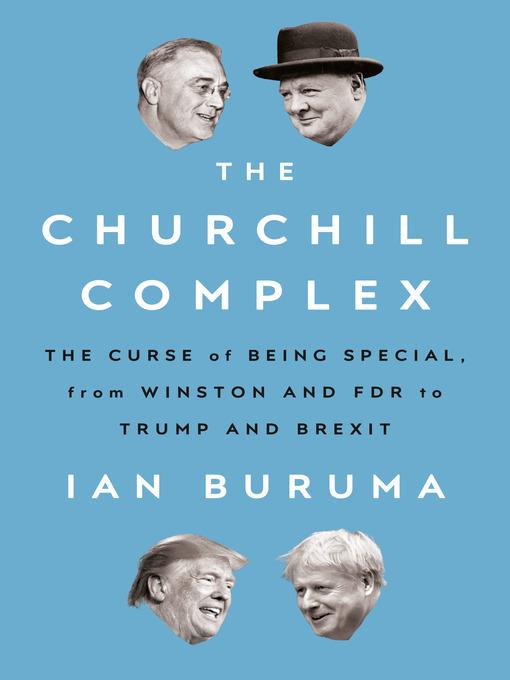
The Churchill Complex
The Curse of Being Special, from Winston and FDR to Trump and Brexit
کتاب های مرتبط
- اطلاعات
- نقد و بررسی
- دیدگاه کاربران
نقد و بررسی

June 15, 2020
The ghost of Winston Churchill looms large over the world--and no one's paying much attention. Is it affection or mutual desperation that fuels the "special relationship" between the U.S. and the U.K.? Dutch-born journalist Buruma ponders the question as he considers the fallen fortunes of that relationship, which Churchill famously proclaimed while delivering his "Iron Curtain" speech after being voted out of office at the end of World War II. "Since then," writes the author, "despite Churchill's mythical spirit living on in the White House, the Anglo-American relationship has been more special in London than in Washington." Indeed, even while he worked closely with Franklin Roosevelt to build the Western Alliance, Churchill found that the interests of the U.S. often diverged from his own. For instance, where Churchill labored long and hard to hold the British Empire together, Roosevelt and his lieutenants publicly advocated the independence of India and other colonies. That independence came, the British Empire dissolved, and Britain became a grudgingly European nation. Meanwhile, Buruma notes, where the U.S. and the U.K. were "once regarded as models of openness, liberalism, and generosity," both nations have become illiberal, nationalistic, and mean-spirited. "Trump, Farage, and the more rabid Tory Brexiteers," writes the author, "spoke obsessively about taking back their countries and making them great again. This talk was either grandiose--Britain as a great global power--or reflected a narrow, chauvinistic view of the world that Roosevelt and Churchill would have found abhorrent." This situation has left it to Angela Merkel and Emmanuel Macron to remind both nations of how democratic nations are supposed to behave. Buruma also astutely examines the relationships of each British leader after Churchill with their American counterpart, almost always a one-sided exchange that not even Beatlemania could even out. A smart, lively political history that illuminates the changing relations of two decidedly unequal partners.
COPYRIGHT(2020) Kirkus Reviews, ALL RIGHTS RESERVED.

July 6, 2020
Buruma (A Tokyo Romance) examines the dynamics between U.S. presidents and British prime ministers in this brisk and insightful history. Positioning Winston Churchill (who was born to a British father and an American mother and used the phrase special relationship to describe the Anglo-American alliance in a 1946 speech) as the embodiment of the principles behind the partnership, Buruma tracks the ups and downs of the past 75 years. The surprise intergenerational connection between Harold Macmillan and John F. Kennedy was followed by Lyndon Johnson’s overbearing, almost abusive, treatment of Harold Wilson, according to Buruma, while Margaret Thatcher’s synergy with Ronald Reagan was bookended by her lack of rapport with Jimmy Carter and George H.W. Bush. Tony Blair and George W. Bush bonded over their efforts to overcome alcoholism, Buruma writes, and Blair’s “messianic streak” dovetailed with Bush’s “evangelical view of American destiny” in the lead-up to the 2003 invasion of Iraq. Barack Obama’s move toward Germany as a preferred ally coincided with the rise of political sentiments behind the era of Trump and Brexit, which Buruma describes as a time when the return to “greatness” means “the planned destruction of the very ideals—open, internationalist, liberal—that many people once admired most about the Anglo-American order.” Though his analysis doesn’t break much new ground, Buruma writes fluidly and paints vivid sketches of key figures and moments. Political history buffs will be fascinated.

July 17, 2020
Buruma (human rights & journalism, Bard Coll.; Year Zero: A History of 1945) uses his extensive knowledge of Britain and America to examine the "Special Relationship," as Winston Churchill called it, between the two nations. The author works chronologically from World War II [to when?], as he shows Churchill's influence on every future prime minister. This book also offers insight into Churchill's influence on U.S. presidents Franklin D. Roosevelt and Barack Obama, among others. The examination moves along to John F. Kennedy and Harold Macmillan as they maneuvered through the Cuban Missile Crisis and then to Lyndon B. Johnson and the start of the Vietnam War. The analysis of Ronald Reagan and Margaret Thatcher is especially poignant as the philosophies on both sides of the Atlantic started to become more conservative. Buruma provides the major reason for this change as neither politician had been personally involved in World War II. The work concludes with an analysis of current President Donald Trump and Prime Minister Boris Johnson as both adhere to national populist views and deal with the Brexit decision. VERDICT Fans of Buruma's works, political analysis, and Churchill's legacy will find much to discover here.--Jason L. Steagall, Arapahoe Libs., Centennial, Colorado
Copyright 2020 Library Journal, LLC Used with permission.

























دیدگاه کاربران